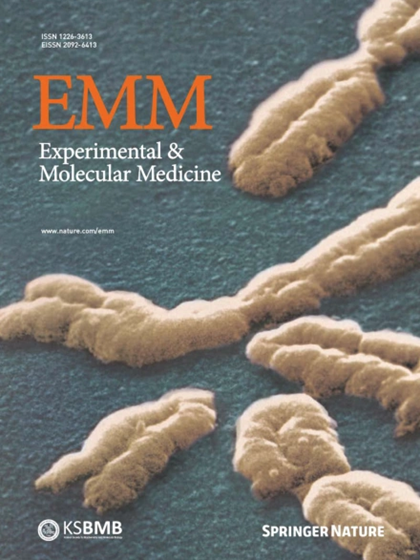KLF6 介导的 p300 复合物招募增强了 H3K23su,并与 FOSL2 协同上调 SEMA3C,从而驱动结肠癌细胞产生 5-FU 抗性。
IF 9.5
2区 医学
Q1 BIOCHEMISTRY & MOLECULAR BIOLOGY
引用次数: 0
摘要
组蛋白赖氨酸琥珀酰化是一种新兴的表观遗传标记,它与多种细胞功能有关,但其在癌症耐药性中的作用却不甚明了。在这里,我们研究了5-氟尿嘧啶(5-FU)耐药的HCT15结肠癌细胞中组蛋白3赖氨酸23琥珀酰化(H3K23su)的全基因组改变及其对基因表达的影响。我们利用CUT&Tag检测法,通过整合ATAC-seq和RNA测序数据,确定了5-FU耐药HCT15细胞中H3K23su的差异富集区(DER)。我们还利用图案富集分析和染色质免疫共沉淀实验剖析了涉及转录因子(TF)(特别是 FOSL2 和 KLF6)及其下游靶基因的调控网络。结果发现,H3K23su DERs、差异表达基因(DEGs)和H3K27ac之间存在很强的正相关性,表明H3K23su富集与基因活化密切相关。与H3K23su GAIN区域相关的DEGs明显富集于与结直肠癌相关的通路,包括Wnt、MAPK和p53信号通路。FOSL2和KLF6是可能调节与H3K23su DERs相关的DEGs的关键TFs,并被发现是维持5-FU耐药性的关键。值得注意的是,我们发现FOSL2和KLF6招募PCAF-p300/CBP复合物协同调控SEMA3C的表达,随后调控典型的Wnt-β-catenin信号通路,导致MYC和FOSL2的上调。这项研究表明,H3K23su是结肠癌细胞对5-FU耐药的关键表观遗传决定因素,它通过调控关键基因和TFs发挥影响。这些研究结果表明,针对参与 H3K23su 修饰的 TFs 或酶进行干预可能是治疗对 5-FU 治疗耐药的结直肠癌的潜在治疗策略。本文章由计算机程序翻译,如有差异,请以英文原文为准。

KLF6-mediated recruitment of the p300 complex enhances H3K23su and cooperatively upregulates SEMA3C with FOSL2 to drive 5-FU resistance in colon cancer cells
Histone lysine succinylation, an emerging epigenetic marker, has been implicated in diverse cellular functions, yet its role in cancer drug resistance is not well understood. Here we investigated the genome-wide alterations in histone 3 lysine 23 succinylation (H3K23su) and its impact on gene expression in 5-fluorouracil (5-FU)-resistant HCT15 colon cancer cells. We utilized CUT&Tag assays to identify differentially enriched regions (DERs) of H3K23su in 5-FU-resistant HCT15 cells via integration with ATAC-seq and RNA sequencing data. The regulatory network involving transcription factors (TFs), notably FOSL2 and KLF6, and their downstream target genes was dissected using motif enrichment analysis and chromatin immunoprecipitation assays. Our results revealed a strong positive correlation between H3K23su DERs, differentially expressed genes (DEGs) and H3K27ac, indicating that H3K23su enrichment is closely related to gene activation. The DEGs associated with the H3K23su GAIN regions were significantly enriched in pathways related to colorectal cancer, including the Wnt, MAPK and p53 signaling pathways. FOSL2 and KLF6 emerged as pivotal TFs potentially modulating DEGs associated with H3K23su DERs and were found to be essential for sustaining 5-FU resistance. Notably, we discovered that FOSL2 and KLF6 recruit the PCAF–p300/CBP complex to synergistically regulate SEMA3C expression, which subsequently modulates the canonical Wnt–β-catenin signaling pathway, leading to the upregulation of MYC and FOSL2. This study demonstrated that H3K23su is a critical epigenetic determinant of 5-FU resistance in colon cancer cells, exerting its effects through the modulation of critical genes and TFs. These findings indicate that interventions aimed at targeting TFs or enzymes involved in H3K23su modification could represent potential therapeutic strategies for treating colorectal cancers that are resistant to 5-FU treatment. Colon cancer is a major health concern worldwide, with treatments such as chemotherapy often facing challenges due to drug resistance. This study explores why colon cancer cells become resistant to the common chemotherapy drug 5-fluorouracil. The researchers focused on a process called lysine succinylation and its role in drug resistance. Using advanced techniques such as CUT&Tag (a method to study protein–DNA interactions), they examined changes in specific proteins in colon cancer cells resistant to 5-fluorouracil. They found that certain proteins, including FOSL2 and KLF6, help to maintain this resistance by affecting gene expression through pathways such as Wnt–β-catenin. The study concludes that targeting these proteins and pathways could help to overcome drug resistance in colon cancer. Future research may focus on developing new treatments that disrupt these processes, potentially improving outcomes for patients with resistant colon cancer. This summary was initially drafted using artificial intelligence, then revised and fact-checked by the author.
求助全文
通过发布文献求助,成功后即可免费获取论文全文。
去求助
来源期刊

Experimental and Molecular Medicine
医学-生化与分子生物学
CiteScore
19.50
自引率
0.80%
发文量
166
审稿时长
3 months
期刊介绍:
Experimental & Molecular Medicine (EMM) stands as Korea's pioneering biochemistry journal, established in 1964 and rejuvenated in 1996 as an Open Access, fully peer-reviewed international journal. Dedicated to advancing translational research and showcasing recent breakthroughs in the biomedical realm, EMM invites submissions encompassing genetic, molecular, and cellular studies of human physiology and diseases. Emphasizing the correlation between experimental and translational research and enhanced clinical benefits, the journal actively encourages contributions employing specific molecular tools. Welcoming studies that bridge basic discoveries with clinical relevance, alongside articles demonstrating clear in vivo significance and novelty, Experimental & Molecular Medicine proudly serves as an open-access, online-only repository of cutting-edge medical research.
 求助内容:
求助内容: 应助结果提醒方式:
应助结果提醒方式:


